The Role of AI Chatbots in Boosting Sales Performance
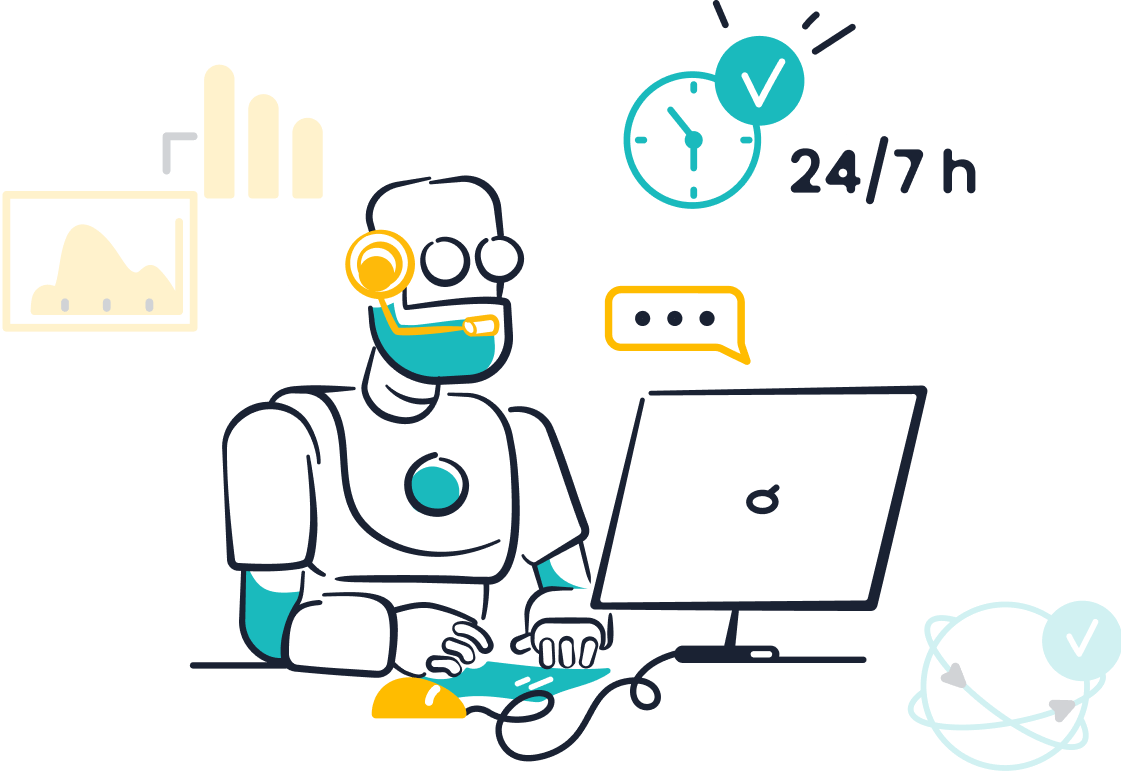
AI chatbots have become a game-changer in the sales world. They handle customer inquiries instantly, ensuring smoother interactions. For instance, 75% of customers now expect immediate responses, which chatbots deliver seamlessly. Businesses using AI chatbots, like Sobot’s customizable solution, report up to a 67% increase in sales. These tools also resolve 80% of routine questions without human involvement, reducing operational costs by billions annually. Moreover, AI-powered chatbots improve conversion rates by 20–40%, making them indispensable for modern businesses. With Sobot’s AI chatbot for sales, you can automate processes, enhance efficiency, and boost revenue effortlessly.
The Growing Importance of AI Chatbots in Sales

How AI Chatbots Are Transforming Sales Processes
AI chatbots are reshaping how businesses approach sales. By automating repetitive tasks, they free up your sales team to focus on closing deals. For example, intelligent chatbots analyze customer interactions to identify recurring objections and interests, helping you refine your sales strategy. A cybersecurity company leveraged chatbot insights to create a compliance landing page, which resulted in more qualified leads.
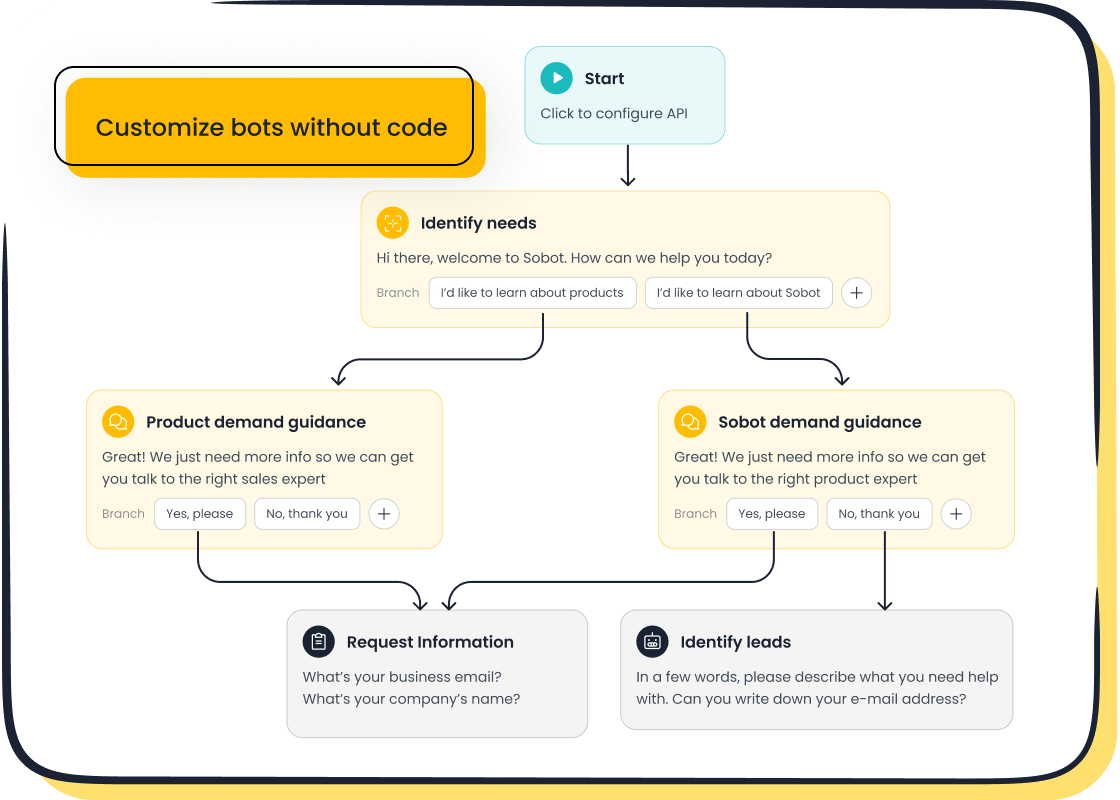
Chatbots also streamline operations. They handle 65% of communication between businesses and consumers, ensuring faster responses and higher satisfaction rates. Companies like Signet use chatbots to deliver personalized shopping experiences, achieving a 90% customer satisfaction score. Additionally, AI chatbots automate lead generation and qualification, saving time and boosting efficiency. With tools like Sobot’s AI chatbot, you can enhance productivity and maximize sales performance effortlessly.
Why Businesses Choose AI Chatbots for Sales
Businesses are increasingly adopting AI chatbots to stay competitive. These tools transform search visibility, helping your brand rank higher in AI-driven search results. Google’s AI now prioritizes contextual understanding, making chatbots essential for improving SEO strategies. Smaller businesses benefit too, as chatbots allow them to compete with larger players by demonstrating expertise and delivering genuine value.
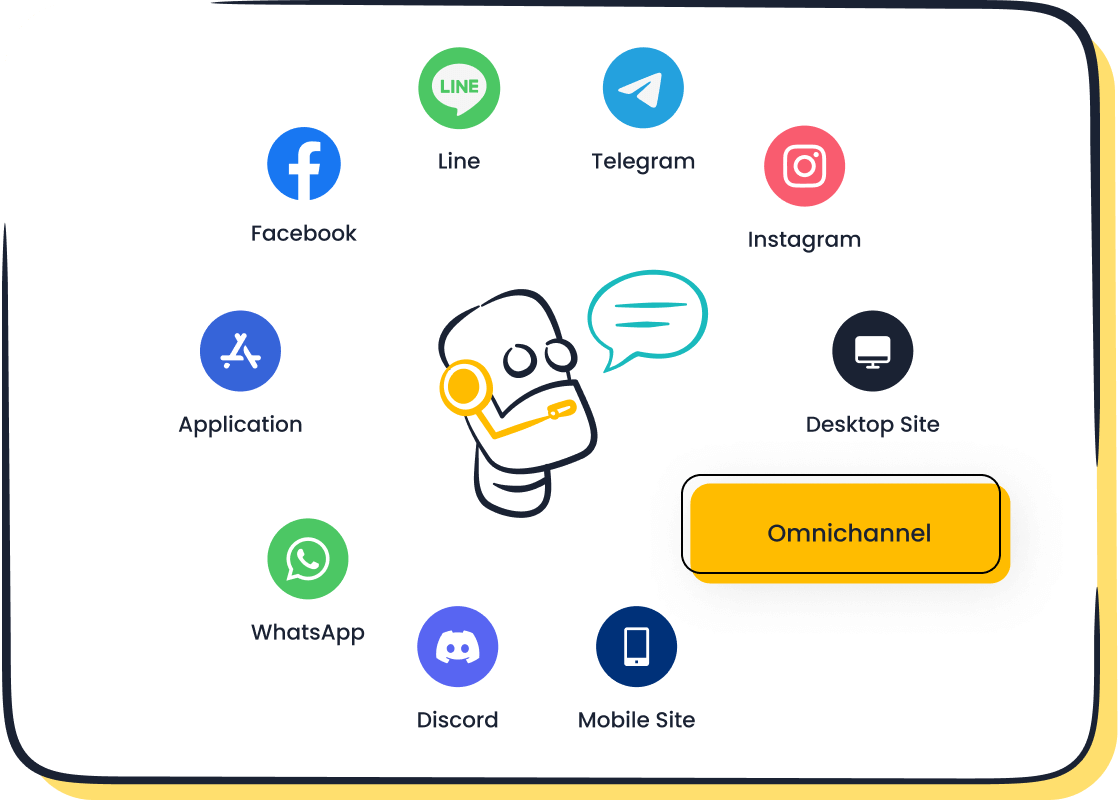
AI chatbots also provide measurable benefits. They save over $11 billion in transaction costs annually and resolve 92% of customer issues without human intervention. With Sobot’s multilingual chatbot, you can interact with customers globally, ensuring seamless communication across channels like WhatsApp and SMS. This versatility makes chatbots indispensable for modern sales strategies.
Key Features of an Effective AI Chatbot for Sales
An effective AI chatbot offers features that enhance your sales process. Knowledge-based chatbots respond to FAQs and redirect complex queries to live agents. Decision tree chatbots guide users through specific goals, such as completing purchases or collecting contact information. Task-specific chatbots handle unique needs like account setup or troubleshooting.
Advanced capabilities like sentiment analysis help you understand customer emotions, improving communication and satisfaction. Chatbots can also replace traditional website forms, making it easier for visitors to share contact details through conversational engagement. Sobot’s AI chatbot combines these features with unsupervised learning and natural language processing, ensuring accurate and context-aware interactions.
Practical Applications of AI Chatbots in Sales
Using AI Chatbots to Generate Leads Efficiently
AI chatbots have revolutionized how businesses generate leads efficiently. These tools engage website visitors in real-time, converting casual browsers into potential customers. For instance, chatbots can initiate conversations, ask qualifying questions, and collect contact details, all without human intervention. This approach ensures that your sales team focuses only on high-quality leads.

Statistics show that companies using chatbots for lead qualification experience a 62.5% success rate. Additionally, businesses report a 40% increase in qualified leads and a 28% rise in conversion rates. The Sobot AI chatbot excels in this area by offering proactive messaging and real-time intent assistance. These features help you capture 30% more leads while reducing service costs.
| Statistic Description | Percentage |
|---|---|
| Companies seeing an increase in high-quality leads | 55% |
| Conversion rates in specific industries | 70% |
| Companies using chatbots for lead qualification | 62.5% |
| Increase in lead generation reported by AI users | 50% |
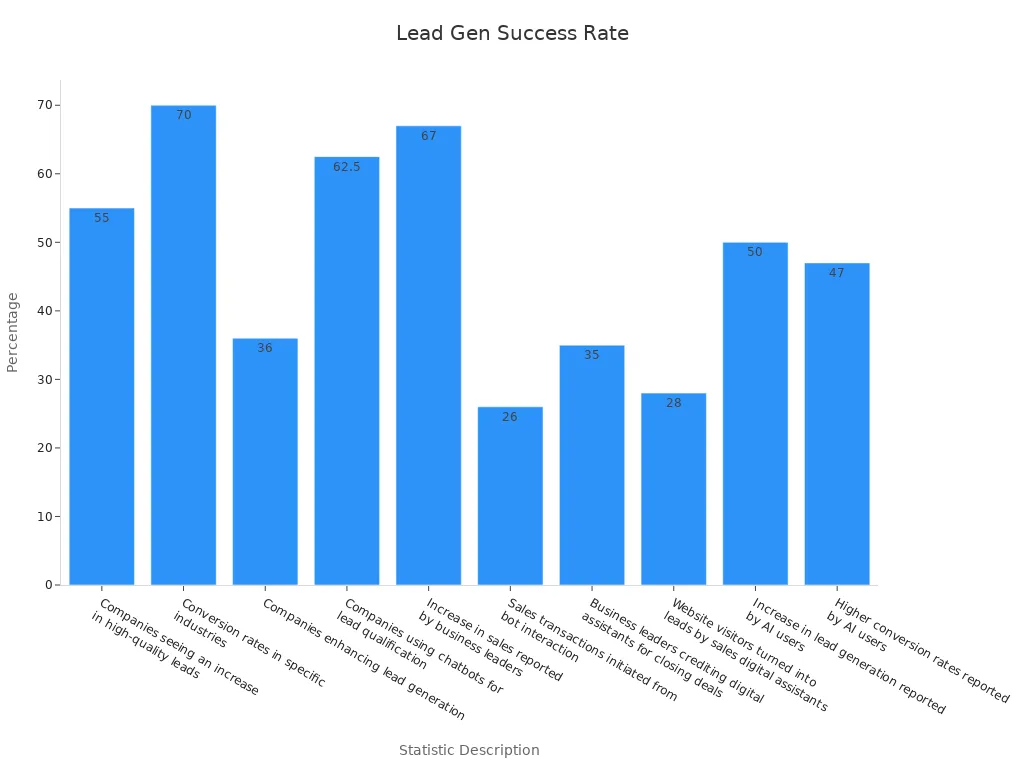
By integrating conversational AI into your sales process, you can streamline lead generation and qualification, ensuring a steady pipeline of prospects.
Instant Customer Support and Query Resolution
AI chatbots provide instant customer support, addressing queries 24/7. This capability ensures that customers receive timely assistance, even outside business hours. Companies using chatbots report a 70% decrease in first response time, leading to higher customer satisfaction and retention rates.
For example, Sobot’s AI chatbot uses a knowledge base to resolve 80% of routine questions autonomously. This feature not only improves response times but also reduces the workload on your support team. By automating support, you can focus on more complex customer needs, enhancing overall efficiency.
Tip: Faster query resolution directly impacts customer loyalty. Businesses that implement customer support automation often see improved Net Promoter Scores (NPS) and long-term client retention.
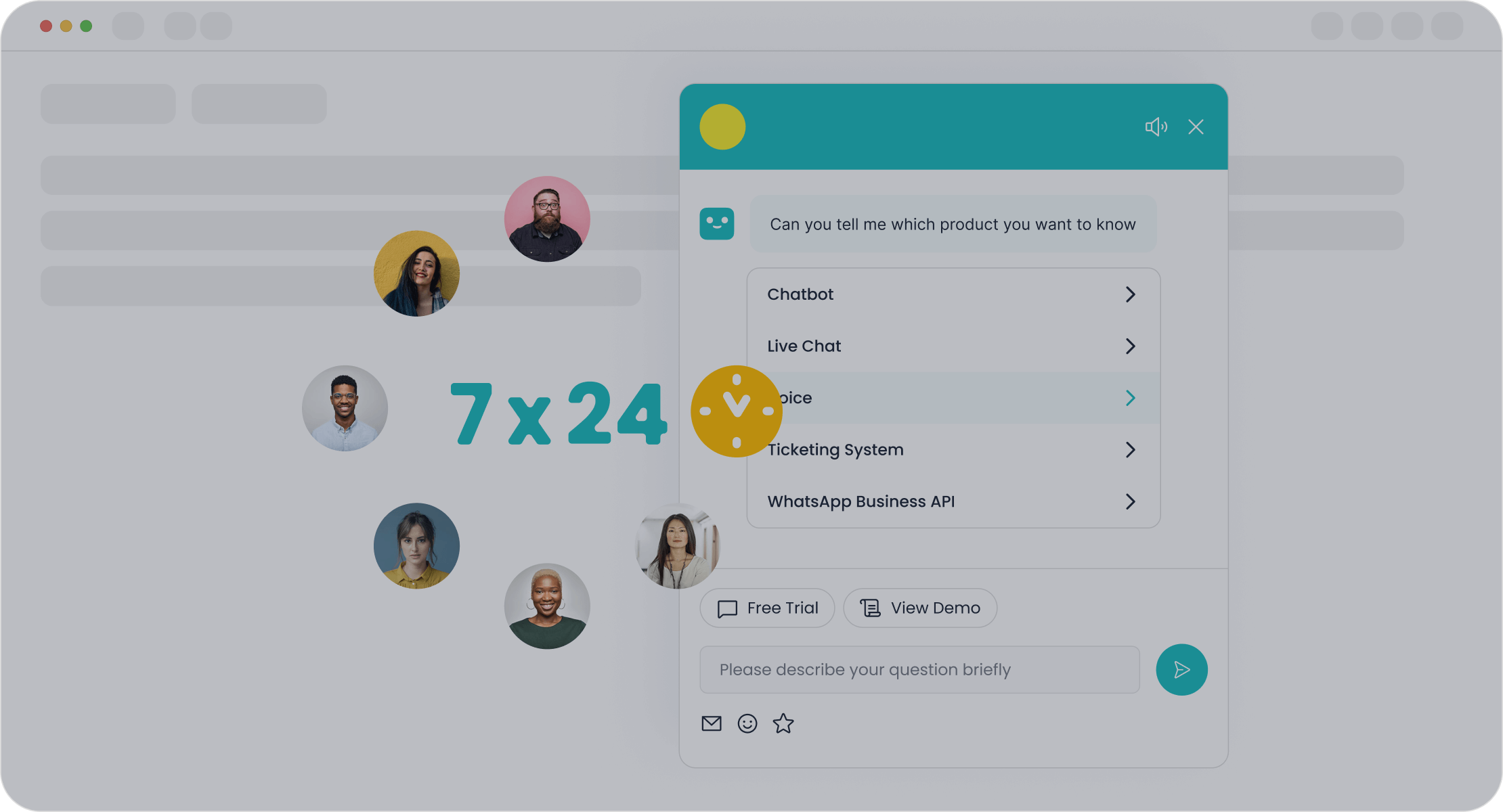
With tools like Sobot, you can ensure seamless communication across channels like WhatsApp and SMS, making your customer support more accessible and effective.
Personalized Product Recommendations with AI Sales Bots
AI sales bots excel at delivering personalized product recommendations. By analyzing customer data such as browsing history, purchase patterns, and social media interactions, these bots suggest products that align with individual preferences. This approach enhances the shopping experience and increases sales.
E-commerce giants like Amazon and Netflix use AI to recommend items, boosting customer engagement and satisfaction. Similarly, Sobot’s AI chatbot leverages advanced analytics to provide tailored suggestions. This feature helps you upsell and cross-sell effectively, improving revenue by up to 15%.
- AI tools predict customer needs and future purchases based on behavior.
- Personalized recommendations increase conversion rates and customer loyalty.
- The more data AI gathers, the more accurate its suggestions become.
By integrating an AI sales bot into your strategy, you can create highly personalized interactions that resonate with your audience, driving both engagement and sales.
Automating Repetitive Sales Tasks
Repetitive tasks often slow down your sales team, reducing their ability to focus on high-value activities. AI chatbots eliminate this bottleneck by automating routine processes, such as answering FAQs, scheduling appointments, and sending follow-up messages. This automation not only saves time but also ensures consistency in customer interactions.
For example, chatbots can handle tasks like order tracking or payment reminders without human intervention. This allows your team to concentrate on closing deals and nurturing relationships with potential leads. By integrating an AI sales bot into your workflow, you can streamline your sales process and boost productivity.
The impact of automating repetitive tasks is measurable. Businesses report:
- A 66% boost in productivity.
- A 68% improvement in operational efficiency.
- A 75% reduction in time spent searching for information.
| Metric | Outcome |
|---|---|
| Sales Growth | Up to 30% increase |
| Operational Efficiency | 40% improvement |
| Customer Satisfaction | 20% higher scores |
These results highlight how AI chatbots transform your operations. With tools like Sobot’s AI chatbot, you can achieve similar outcomes while reducing costs and improving customer satisfaction.
Tip: Automating repetitive tasks doesn’t just save time—it also reduces errors. Chatbots ensure that every interaction follows the same high standard, enhancing your brand’s reputation.
Gathering and Analyzing Customer Data for Insights
AI chatbots excel at collecting and analyzing customer data, providing you with actionable insights to refine your sales strategies. Every interaction with a chatbot generates valuable information, from customer preferences to common pain points. This data helps you understand your audience better and tailor your approach to meet their needs.
For instance, chatbots gather real-time data, such as customer feedback and preferences, which can be instantly added to your CRM system. They also analyze past interactions and purchase history to predict future behavior. This allows you to personalize your sales efforts, improving customer satisfaction and loyalty.
| Benefit | Description |
|---|---|
| Real-time data collection | Chatbots gather valuable CRM data, including customer feedback and preferences, instantly. |
| Personalization of experiences | They tailor interactions based on customer data, enhancing user satisfaction. |
| Analysis of preferences and behaviors | Chatbots track customer inquiries and preferences, refining marketing strategies effectively. |
AI sales bots also use advanced analytics to identify trends and opportunities. For example, they can detect patterns in customer inquiries, helping you optimize your product offerings or marketing campaigns. By leveraging these insights, you can make data-driven decisions that drive growth.
Note: Continuous learning is a key feature of AI chatbots. The more interactions they handle, the better they become at understanding customer needs and delivering personalized experiences.
By incorporating AI into your sales process, you gain a competitive edge. Tools like Sobot’s AI chatbot not only automate data collection but also provide the analytics you need to stay ahead in a dynamic market.
Measurable Benefits of AI Chatbots for Sales Teams
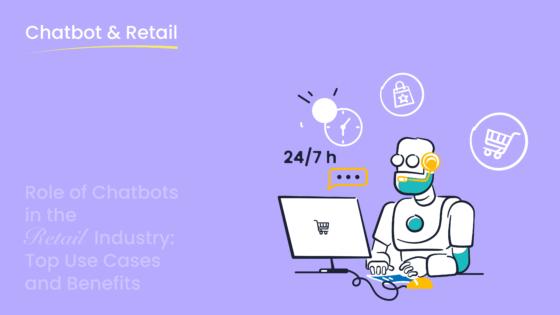
Increased Efficiency in Sales Operations
AI chatbots significantly enhance the efficiency of your sales operations by automating repetitive tasks and streamlining workflows. They handle routine queries, schedule appointments, and send follow-up messages, allowing your sales team to focus on high-value activities like closing deals and nurturing relationships. For example, sales professionals save an average of 2 hours and 15 minutes daily with AI assistance, giving them more time to strategize and engage with leads.
Chatbots also reduce the time spent on administrative tasks. This improvement enables your team to identify upselling opportunities and customize solutions for clients. A telecom company using AI chatbots resolved 68% of billing inquiries autonomously, reducing churn by 19% in just six months. Additionally, businesses using chatbots report a 40% faster resolution of tickets, leading to better productivity.
| Benefit Description | Quantitative Impact |
|---|---|
| Reduced time on admin tasks | Sales reps focus more on driving sales |
| Easier identification of upsell opportunities | Higher sales conversion rates |
| Lower stress levels | Enhanced performance and focus |
| Improved job satisfaction | Stronger customer relationships |
By integrating tools like Sobot’s AI chatbot, you can achieve similar results. Its automation capabilities improve sales efficiency while reducing operational costs.
Enhanced Customer Experience and Satisfaction
AI chatbots play a pivotal role in improving the customer experience. They provide instant, 24/7 support, ensuring that customers receive timely assistance regardless of the hour. This responsiveness leads to higher satisfaction rates. In fact, 69% of consumers reported being satisfied with their last chatbot interaction, showcasing the effectiveness of AI in customer service.
Personalization is another key benefit. Chatbots analyze customer data to deliver tailored recommendations and solutions. For instance, Sobot’s AI chatbot uses advanced analytics to understand customer preferences, enabling you to offer personalized product suggestions. This approach not only enhances the shopping experience but also fosters loyalty.
Tip: Customers value quick and accurate responses. By using chatbots, you can resolve simpler queries efficiently, leaving complex issues for human agents. This balance improves overall satisfaction.
Moreover, businesses using chatbots have seen a 15-point increase in Customer Satisfaction (CSAT) scores. With tools like Sobot, you can elevate your customer interactions and build stronger relationships.
Higher Conversion Rates and Revenue Growth
AI chatbots directly impact your bottom line by improving lead conversion rates and driving revenue growth. They engage with website visitors in real-time, qualifying leads and guiding them through the sales process. This proactive approach ensures that potential customers don’t slip through the cracks.
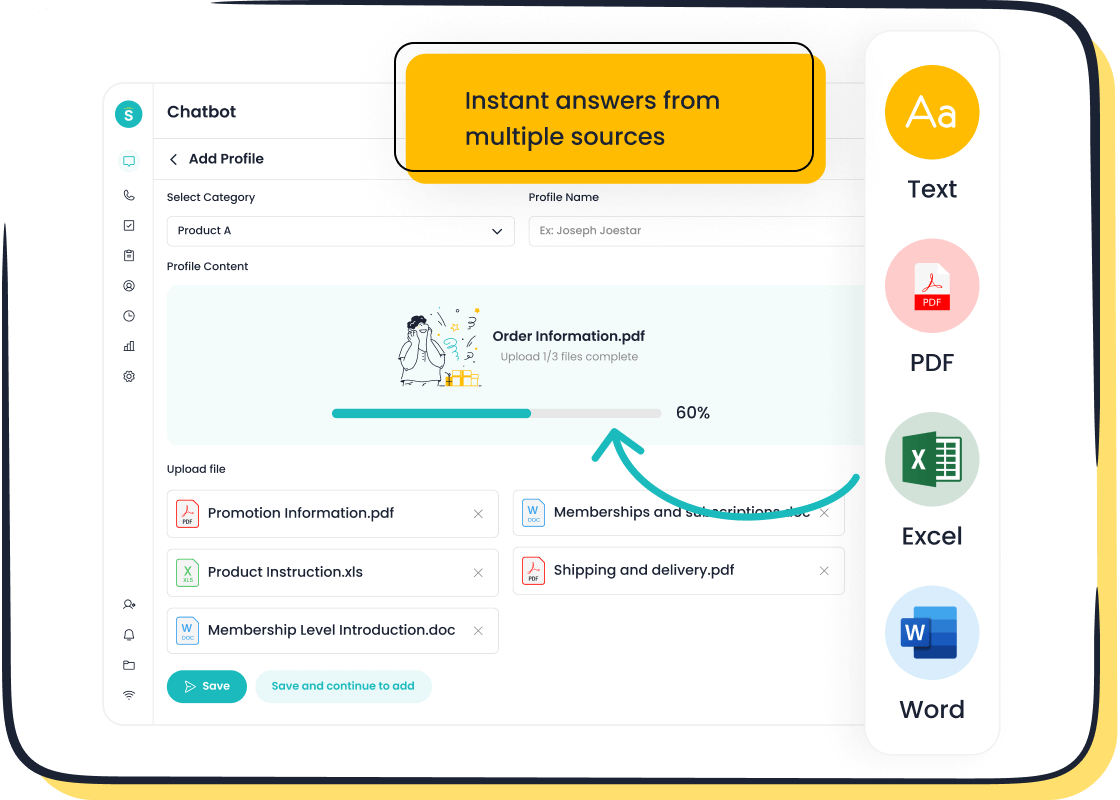
Studies show that websites using AI chatbots experience a 23% increase in conversion rates. In some industries, the success rate reaches as high as 70%. For example, Sobot’s AI chatbot boosts conversions by 20% through smart self-service and real-time intent assistance. These features help you capture more leads and turn them into paying customers.
| Source | Conversion Rate Improvement | Additional Notes |
|---|---|---|
| Glassix Study | 23% increase | Significant improvement with AI chatbots |
| Amra & Elma | Up to 70% success rate | High effectiveness in certain industries |
| Spiceworks | 10%-30% increase | 56% reported at least a 10% improvement |

By leveraging AI chatbots like Sobot’s, you can improve sales performance, increase conversions, and achieve sustainable revenue growth.
Cost Savings Through Automation
AI chatbots offer a powerful way to reduce costs while maintaining high-quality customer interactions. By automating routine tasks, they eliminate the need for additional staffing and streamline operations. For example, chatbots can handle inquiries, schedule appointments, and provide instant responses, all without human intervention. This efficiency translates into significant savings for businesses.
Leading organizations have already seen remarkable results. A global retail company reduced contact center staffing costs by 40% after adopting advanced chatbots. Similarly, a major bank saved 35% on operational expenses by integrating chatbots into its customer support channels. Research from Gartner highlights that AI-powered chatbots can cut operational costs by up to 30%, while IBM’s study shows that chatbots manage 80% of routine inquiries.
Tip: Automating customer support doesn’t just save money—it also improves response times and customer satisfaction. Faster resolutions lead to happier customers and fewer escalations.
With tools like Sobot’s AI chatbot, you can achieve round-the-clock availability, ensuring customers receive timely assistance while reducing expenses. This approach allows you to allocate resources more effectively, focusing on areas that drive growth and innovation.
Scalability for Growing Businesses
AI chatbots provide the scalability needed to support growing businesses. As your customer base expands, chatbots adapt to handle increased interactions without compromising service quality. This flexibility ensures that your sales process remains efficient, even during peak times.
Companies across industries have leveraged chatbots to scale their operations successfully. In retail e-commerce, one business achieved a 30% increase in sales and reduced cart abandonment by 25%. Financial services firms report a 25% boost in lead conversion rates and faster qualifying times. In travel and hospitality, chatbots enhanced booking revenue by 20% while improving response times and customer satisfaction.
| Company | Industry | Sales Increase | Additional Benefits |
|---|---|---|---|
| Company A | Retail E-Commerce | 30% | 25% decrease in cart abandonment, improved customer satisfaction |
| Company B | Financial Services | 25% | Increased lead conversion rates, reduced manual qualifying time |
| Company C | Travel and Hospitality | 20% | Enhanced booking revenue, improved response times and customer satisfaction |
AI chatbots also integrate seamlessly into your sales tech stack, ensuring compatibility with existing tools like CRM systems and analytics platforms. This integration with analytics provides real-time insights, helping you identify opportunities and optimize your strategies.
Note: Scalability isn’t just about handling more interactions—it’s about maintaining quality and consistency as your business grows. Chatbots ensure every customer receives the same level of attention, no matter how large your audience becomes.
With Sobot’s AI chatbot, you can scale your operations effortlessly, winning back abandoned carts and capturing more leads. This adaptability makes chatbots an essential tool for businesses aiming to grow without increasing costs.
Overcoming Challenges in Implementing AI Chatbots
Addressing Initial Setup and Integration Hurdles
Implementing AI chatbots can present technical challenges during the initial setup. One common issue is ensuring smooth data synchronization between the chatbot and existing systems. Without proper integration, the chatbot may fail to access critical customer information, leading to inefficiencies. Robust API integration is essential for seamless communication with tools like CRM platforms and databases.
Scaling the chatbot system as your business grows is another hurdle. Performance bottlenecks can arise if the system isn’t designed to handle increased interactions. Regular performance monitoring helps identify and resolve these issues before they impact users. For example, businesses that implement proactive monitoring often experience fewer disruptions and higher customer satisfaction.
| Challenge | Description |
|---|---|
| Data Synchronization | Ensuring smooth data flow between AI systems and existing databases is crucial for effectiveness. |
| API Integration | Robust APIs are essential for seamless communication with CRM and databases. |
| Scaling | Maintaining performance as the chatbot system grows is critical to avoid bottlenecks. |
| Performance Management | Regular monitoring helps identify issues before they impact users. |
By addressing these challenges early, you can ensure a smoother implementation process and maximize the benefits of your chatbot system.
Ensuring Data Privacy and Security Compliance
Data privacy and security are critical concerns when deploying AI chatbots. Customers expect their personal information to be handled responsibly. To meet these expectations, businesses must implement strong encryption and access controls. Regular audits help identify vulnerabilities and ensure compliance with regulations like GDPR and CCPA.
Tip: Build trust by being transparent about how you collect and use customer data. Obtaining prior consent for data collection is not only a legal requirement but also a way to reassure users.
Organizations should also establish data protection agreements with third-party vendors. These agreements ensure that sensitive information remains secure throughout the chatbot’s operations. By prioritizing privacy and security, you can foster customer confidence and protect your brand reputation.
Maintaining Chatbot Accuracy and Relevance
Keeping your chatbot accurate and relevant requires continuous optimization. Chatbots must retrieve consistent and relevant results to maintain user satisfaction. Metrics like search stability and search relevance help measure the chatbot’s performance. For instance, precision@K evaluates how often the top results match user expectations, providing a clear indicator of accuracy.
A study comparing chatbot responses to human responses found that chatbots excel at recognizing context and delivering complete answers. However, they sometimes generate longer responses, which may not always align with user preferences. Regular A/B testing can help refine the chatbot’s algorithms to improve engagement and satisfaction.
| Metric | Description |
|---|---|
| Search Stability | Measures the chatbot’s ability to retrieve consistent results from semantically equivalent inputs. |
| Search Relevance | Assesses the quality of search results based on their relevance and order. |
| Precision@K | Evaluates how often the top K results match labeled relevant results. |
| A/B Testing | Compares different ranking algorithms to determine which yields better user engagement and satisfaction. |
By leveraging advanced tools like LLMs, you can enhance your chatbot’s ability to adapt to user needs. Continuous learning ensures that your chatbot remains a valuable asset in your sales strategy.
Balancing Automation with Human Interaction
Finding the right balance between automation and human interaction is crucial for delivering exceptional customer experiences. While chatbots excel at handling repetitive tasks, human agents bring empathy and creativity to complex situations. Combining these strengths ensures your customers receive both efficiency and personalized care.
Businesses often use chatbots to manage frequent inquiries, such as shipping updates or return policies. This approach enhances response times and allows your support team to focus on more intricate issues. For example:
- Companies integrate chatbots to provide quick answers while reserving human agents for escalated concerns.
- AI chatbots streamline routine tasks, enabling agents to deliver empathetic support when it matters most.
This balance not only improves customer satisfaction but also boosts operational efficiency. By automating repetitive queries, you free up resources to address unique customer needs. Tools like Sobot’s chatbot help you achieve this harmony by seamlessly transitioning conversations from bots to human agents when necessary.
Tip: Use chatbots to handle high volumes of inquiries during peak times. This strategy ensures faster responses without overwhelming your team.
Best Practices for Successful AI Chatbot Deployment
Deploying an AI chatbot effectively requires careful planning and execution. Start by defining clear goals. Identify specific problems the chatbot will solve, such as reducing response times or improving lead qualification. This clarity ensures your chatbot aligns with your business objectives.
Choosing the right platform is equally important. Look for solutions that offer customization and scalability. For instance, Sobot’s chatbot provides multilingual support and integrates with various communication channels, making it adaptable to your needs.
Training your chatbot with historical data enhances its performance. Use real-world scenarios to teach it how to respond accurately. Regularly monitor its interactions to identify areas for improvement. Businesses that analyze chatbot performance often report higher success rates in customer engagement.
Here are some best practices to follow:
- Define your chatbot’s purpose and scope.
- Select a platform that supports your growth.
- Train the chatbot using real customer data.
- Monitor and optimize its performance regularly.
- Evaluate success rates to measure its impact.
For example, an e-commerce company reduced support ticket volume by 30% after deploying a chatbot. Similarly, a healthcare organization improved patient engagement while cutting administrative workload. These results highlight the importance of strategic implementation.
Note: Regular updates and optimizations keep your chatbot relevant and effective. This ensures it continues to meet your customers’ evolving needs.
The Future of AI Chatbots in Sales
Emerging Trends in AI-Powered Sales Tools
AI-powered sales tools are evolving rapidly, introducing innovative features that transform how you engage with customers. These tools focus on personalization, making interactions more meaningful. AI-driven personalization analyzes customer data to tailor recommendations, ensuring every conversation feels unique. For example, Sobot’s chatbot uses advanced analytics to deliver customized product suggestions, boosting engagement and satisfaction.
Gamification is another trend reshaping sales. By incorporating game-like elements, AI tools motivate your sales team to perform better. Imagine earning rewards for meeting sales targets or completing training modules. This approach fosters a competitive yet collaborative environment.
Voice and conversational AI are streamlining customer interactions. These tools enable natural conversations, making communication smoother and more intuitive. Augmented reality (AR) and virtual reality (VR) are also gaining traction, creating immersive sales experiences that captivate your audience.
These trends highlight the growing importance of AI in sales, offering tools that enhance efficiency and engagement.
The Role of AI Chatbots in Omnichannel Sales Strategies
AI chatbots are essential for omnichannel sales strategies. They unify customer interactions across platforms, ensuring a seamless experience. For instance, chatbots provide instant responses on websites, social media, and messaging apps like WhatsApp. This consistency strengthens your brand presence and builds trust.
| Feature | Benefit |
|---|---|
| Instant response across devices | Enhances customer satisfaction and loyalty. |
| Real-time CRM feedback | Facilitates adaptive marketing strategies and dynamic email campaigns. |
| Personalized marketing | Improves engagement through tailored recommendations. |
Sobot’s chatbot excels in omnichannel support, integrating with platforms like WhatsApp and SMS to deliver consistent service. By leveraging AI chatbots, you can adapt to customer needs in real time, ensuring your sales strategy remains effective across all channels.
Predictions for AI Chatbots and Sales Performance
AI chatbots are set to revolutionize sales performance. Experts predict significant advancements in natural language processing, enabling chatbots to understand complex human languages and respond with greater contextual awareness. Hyper-personalization will become a key feature, allowing chatbots to offer tailored recommendations based on user data.
| Metric | Value |
|---|---|
| Increase in sales | 67% |
| Transactions from chatbots | 26% |
| Faster sales | 35% |
| Website visitors turning into leads | 28% |
| Conversion rates | 70% |
| Better lead generation | 50% |
| Increased productivity | 64% |
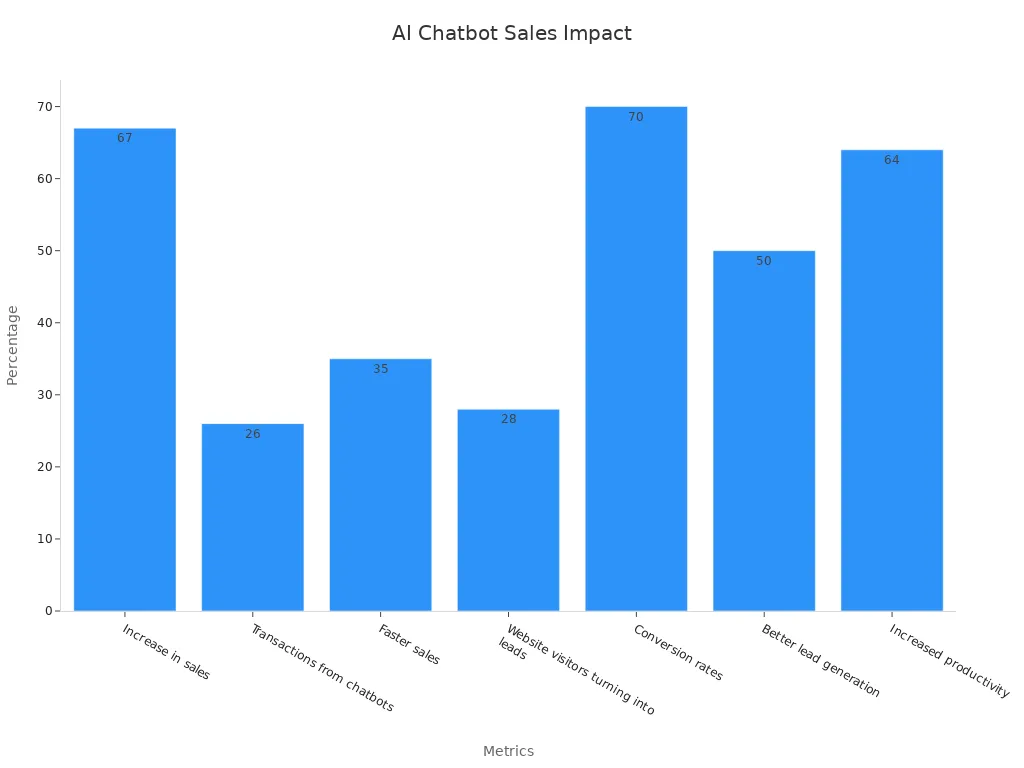
Sobot’s AI chatbot already incorporates predictive behavior analysis, helping you anticipate customer needs and streamline their journey. As generative AI models advance, chatbots will offer even more engaging and human-like interactions, breaking down language barriers and facilitating global market access. These developments will redefine how you approach sales, driving growth and efficiency.
AI chatbots are revolutionizing how businesses approach sales. They automate repetitive tasks, personalize customer interactions, and improve operational efficiency. For example, companies implementing chatbots have seen remarkable results:
| Metric | Before Implementation | After Implementation | Change |
|---|---|---|---|
| Daily Revenue | $17,557.08 | $44,968.61 | +338% |
| Conversion Rate | N/A | Increased by 16% | N/A |
| Total Orders | N/A | Increased by 150% | N/A |
Additionally:
- Businesses reduce customer service costs by up to 30%.
- Websites with chatbots experience a 48% increase in revenue per chat hour.
- Chatbots meet the expectations of 82% of consumers by providing instant responses.
With tools like Sobot’s chatbot, you can streamline operations, enhance customer satisfaction, and achieve higher sales performance. As AI technology advances, chatbots will continue to shape the future of sales, offering even greater opportunities for growth and innovation.
FAQ
1. What is the primary purpose of an AI chatbot in sales?
AI chatbots automate repetitive tasks, engage customers, and provide instant responses. They help you qualify leads, recommend products, and resolve queries. This allows your sales team to focus on closing deals and building relationships.
2. Can AI chatbots work across multiple platforms?
Yes, AI chatbots like Sobot’s support omnichannel communication. They integrate with platforms like WhatsApp, SMS, and social media. This ensures seamless customer interactions, no matter where your audience engages with your brand.
3. How do AI chatbots improve conversion rates?
AI chatbots analyze customer behavior and provide personalized recommendations. They also engage visitors in real-time, guiding them through the sales funnel. These features boost conversions by up to 20%, helping you turn prospects into loyal customers.
Tip: Use proactive messaging to re-engage visitors and reduce cart abandonment.
4. Are AI chatbots difficult to set up?
Not at all! Tools like Sobot’s chatbot offer a no-coding-required interface. You can design workflows using a simple point-and-click system. This makes setup quick and accessible, even for non-technical users.
5. How do AI chatbots ensure data security?
AI chatbots use encryption and comply with regulations like GDPR to protect customer data. Regular audits and secure backups further enhance safety. With Sobot, you can confidently handle sensitive information while maintaining customer trust.
Note: Always inform users about data collection practices to build transparency and trust.
See Also
Enhancing Customer Satisfaction Through E-commerce Chatbots
Increasing Efficiency With AI-Powered Customer Service Tools
Driving Sales Growth With E-commerce Live Chat Solutions
